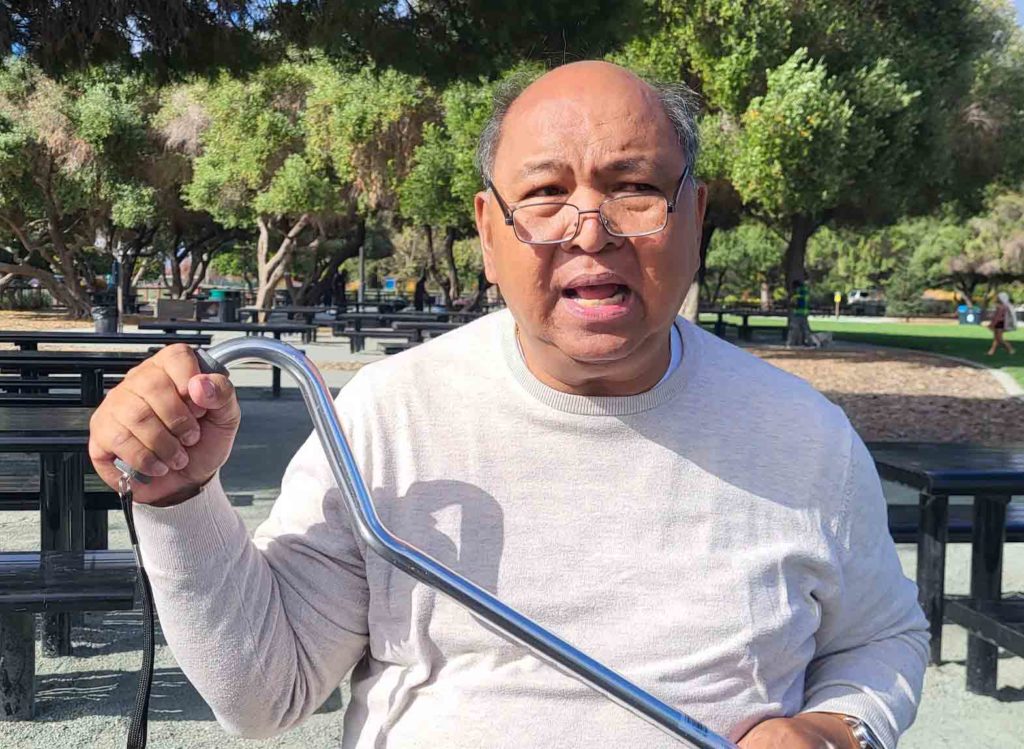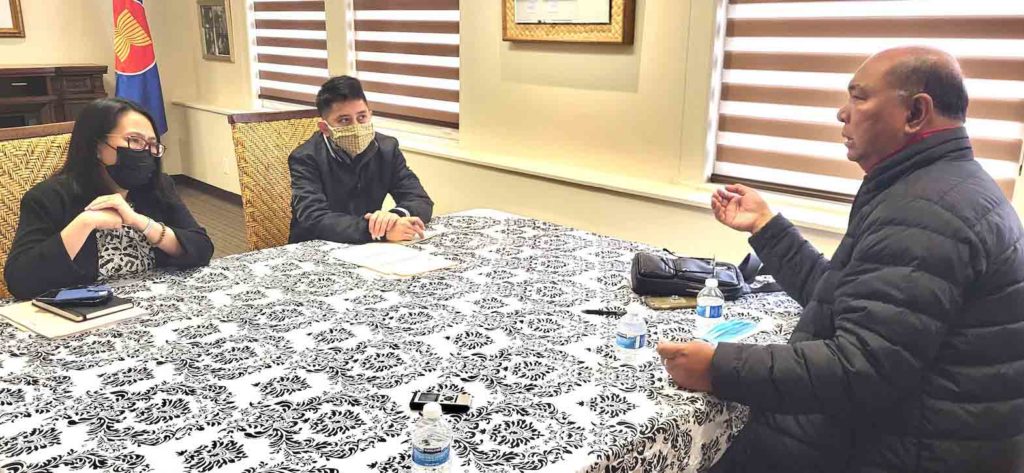Filipino victim of hate crime speaks out, urges others to do so

Pablo Villavicencio is still traumatized by what happened in a BART station last year. INQUIRER/Jun Nucum
SAN FRANCISCO – A Filipino victim of hate crime, and a top Philippine Consulate official, jointly called on Filipinos to report hate incidents and for crime victims to come out, let their stories be heard and avail of help.
Hate crime victim Pablo Villavicencio recently aired his experience and grievances at a meeting with Philippine Deputy Consul General Raquel Solano who is also in charge of assistance to Filipino nationals at the consulate.
Villavicencio shared that more than a year after he was attacked at an East Bay BART station he is still feeling the trauma. “I still cannot recover from my trauma as that could have resulted to me being paralyzed or even my death. Whenever it is talked about, the psychological wounds and sad thoughts it left are still fresh in my mind.”
“I still have to constantly look around before I can feel seated comfortably inside a bus or train. I long for the day when I would feel normal and safe again,” Villavicencio said.
“To all who may have suffered like me, do not be silent. Don’t suffer in silence. Say something so this may no longer happen to anyone else,” he advised.
Villavicencio’s appeal was echoed by Solano, who asked Filipino victims to report to them incidents such as what happened to Villavicencio.
Frightful incident
Villavicencio was looking forward to spending a happy Memorial Day weekend in May last year with his friends and relatives in Los Angeles as he took the BART train.
Upon reaching the West Oakland Station, a young African American girl suddenly dashed in front of him carrying a piece of 2 x 2 wood and took a swing at Villavicencio’s head.
He was able to duck slightly to his right, protecting his head, and the wood hit the backpack on his left shoulder instead. He didn’t feel hurt then and was about to run after the girl who sprinted upstairs to the train platform.
The station agent advised him to not go after the girl as it was not safe for him. Instead, Villavicencio was led into the station booth which a was safer place to be in.
The station agent then called up BART police to seek assistance and policemen, together with a medical team, arrived minutes later. They went up to take custody of the girl whom Villavicencio and the station agent were able to identify.
“When I posted it on social media and was subsequently reported on Filipino media outlets, I received a lot of sympathetic messages that asked among others how I am doing, am I still able to go out on my own, they are still asking if the Philippine government has helped me or at least gotten in touch with me. I said no.
“As time went on, I still carry the emotional and psychological hurt in me. It is very hard to be a victim of a hate crime especially when you live alone with all your loved ones are back in the Philippines. Ang hirap maging biktima lalo na kung ikaw ay nag-iisa.”
Villavicencio admitted that he felt very bad that it even got to the point that he blamed the Philippine government for not even knowing what happened to him, although it was in printed news and even online.
“Where are you when I needed you most? A victim like me needs medical, legal, financial, shelter assistance, among others. Emotionally, he would need a psychiatrist or psychologist,” Villavicencio believes.
”I would also need spiritual guidance as I felt so alone, I was also thinking of taking my own life because of mental torture and fear.”
Villavicencio suggested to Solano that the Consulate has to assign someone in charge because there may be many being victims who may not know where to turn to, go or call, or may not have the courage to come out and report their experience.

PCGSF Deputy Consul General Raquel Solano (extreme left) listens as hate crime victim Pablo Villavicencio (extreme right) narrates his ordeal and speaks out on behalf of hate victims. INQUIRER/Jun Nucum
“We should always be monitored as we also have a lot of things we need to do. Life does not stop when we get victimized,” Villavicencio stressed.
“I am speaking out in the hope that this does not happen to anyone else, for anyone to fall victim and get hurt. I am thankful to God that nothing worse than this happened. Say something so this may no longer happen to anyone else,” Villavicencio advised.
Solano echoed Villavicencio’s appeal and asked Filipino victims to report hate incidents to the consulate.
Victims of hate crimes and incidents are advised to first call law enforcement authorities for immediate response, inform the Consulate of what happened so appropriate assistance may be extended subject to evaluation by the Department of Foreign Affairs. Victims can call 415-2692090 or 415-7489888 to reach the PCGSF 24/7.
Solano admitted that not every news of victims reaches the Consulate and said she was happy that they are now consulting with Villavicencio.
Solano added that they are not automatically given information by the police mainly due to privacy laws in California. Victims usually have to go through to legal proceedings and have to give consent before Consulate officials can have access to police records.
“When it comes to the need of Filipinos we have a section here in the Consulate that attends to assistance to nationals that provides assistance based on a set of guidelines. We determine first if he is a Filipino national, needs financial or legal assistance, and if he has the capacity pay considering the limited Philippine government resources, so we can help those who really need help.”
Only when the resources available within the community are exhausted “will we endorse the request to avail of the assistance to national funds from the DFA that will determine and finally decide on the request,” Solano explained.
Solano promised to refer and endorse Villavicencio’s request for the services available if asked and he will be informed of any development.
“In his case, the assistance that we may give him is legal assistance when there is sufficient basis to file a case. Then financial assistance if he does not have the capacity to support himself. On psycho-social support, we can refer him to an entity for this,” Solano explained.

